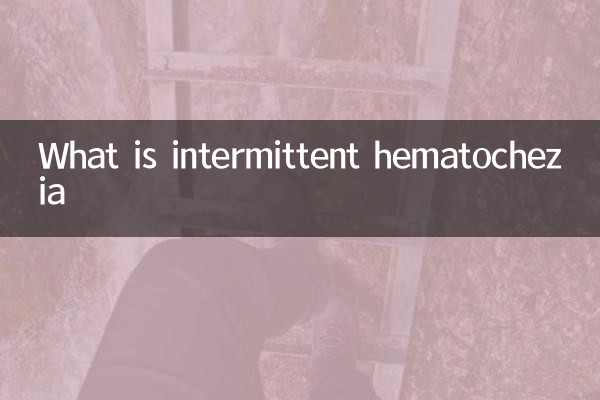What is intermittent hematochezia
Intermittent hematochezia is a common digestive tract symptom, which refers to the presence of blood in the stool or the discharge of pure blood during defecation, and the symptoms are intermittent. This phenomenon may be caused by a variety of diseases and requires attention. This article will combine recent hot topics and medical knowledge on the Internet to provide you with a detailed analysis of the relevant content of intermittent blood in the stool.
1. Common causes of intermittent bloody stools

According to recent popular discussions in the medical and health field, the main causes of intermittent bloody stools include:
| Cause classification | specific disease | Proportion |
|---|---|---|
| Anorectal disease | Hemorrhoids, anal fissure | 45% |
| intestinal inflammation | Ulcerative colitis, Crohn's disease | 25% |
| Digestive tract tumors | Colon cancer, rectal cancer | 15% |
| other reasons | Intestinal polyps, vascular malformations | 15% |
2. Recent hot topics of discussion about blood in the stool
By analyzing the Internet hot spots in the past 10 days, we found that the following topics related to blood in the stool have attracted much attention:
| topic | Discussion popularity | main focus |
|---|---|---|
| The proportion of young people with blood in their stools is increasing | high fever | Relationship with bad living habits |
| The dangers of painless bloody stools | medium heat | May be an early sign of bowel cancer |
| Differentiation between hemorrhoids and bowel cancer | high fever | How to differentiate between two diseases |
| Seeing a doctor for blood in the stool during the epidemic | low fever | Choosing the time to seek medical treatment |
3. Typical symptoms of intermittent hematochezia
According to recent medical consultation big data, the most common symptoms of patients with intermittent blood in the stool are:
| Symptoms | Feature description | Hazard level |
|---|---|---|
| Blood attached to feces | The blood is bright red and adheres to the surface of the feces | low risk |
| Dark red bloody stool | The blood is mixed with the stool and is darker in color | medium risk |
| tarry black stool | Feces is black and shiny | high risk |
| accompanying symptoms | Abdominal pain, weight loss, tenesmus | Very high risk |
4. Issues related to blood in the stool that patients are most concerned about recently
Based on the data from the medical Q&A platform in the past 10 days, the top five questions that patients are most concerned about are sorted out:
1. Will blood in the stool heal on its own?
2. What situations require immediate medical attention?
3. Which is more important, colonoscopy or digital anal examination?
4. How much influence does diet have on blood in the stool?
5. Should young people worry about cancer if they have blood in their stools?
5. Diagnostic methods for intermittent hematochezia
The current diagnostic process recommended by the medical community is as follows:
| Check items | Inspection purpose | Applicable people |
|---|---|---|
| Digital anal examination | Preliminary diagnosis of hemorrhoids, anal fissures, etc. | All patients with hematochezia |
| fecal occult blood test | Detecting trace amounts of bleeding | Those with mild symptoms |
| colonoscopy | Direct vision observation of intestinal lesions | Over 40 years old or high-risk groups |
| Imaging examination | Assess tumor extent | Suspected malignant tumors |
6. Prevention and treatment suggestions
Based on recent recommendations from medical experts, the following should be noted to prevent and treat intermittent blood in the stool:
1.Diet modification:Increase dietary fiber intake to keep bowel movement smooth.
2.Living habits:Avoid sitting and standing for long periods of time and exercise moderately.
3.Seek medical attention promptly:If repeated blood in the stool occurs, seek medical attention promptly.
4.Regular screening:People over 40 years old are recommended to undergo regular colonoscopy.
5.Psychological adjustment:Avoid excessive anxiety and understand the disease scientifically.
7. Summary
Intermittent blood in the stool is a common manifestation of a variety of digestive tract diseases. It may be caused by benign diseases such as hemorrhoids, or it may be a sign of serious diseases such as bowel cancer. Analysis of recent Internet hot spots shows that the public's attention to the problem of blood in the stool continues to increase, especially among young people, the phenomenon of blood in the stool has caused widespread discussion. It is recommended to seek medical treatment promptly when symptoms occur and to identify the cause through professional examination to avoid delays in treatment.

check the details

check the details